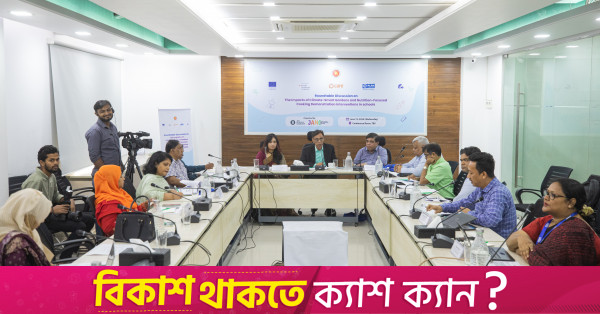Climate-smart gardening, cooking foster holistic development in school children: Experts


They said despite nationwide ridicule about teaching how to fry an egg under the new education curriculum, the JANO Project is effectively raising awareness among school students in two districts about climate-smart home gardening, cooking skills, and nutrition.
Participants at a round table on “The Impacts of Climate-Smart Gardens and Nutrition-Focused Cooking Demonstration Interventions in Schools” at TBS conference room in the capital on Wednesday. Photo: Rajib Dhar
“>
Participants at a round table on “The Impacts of Climate-Smart Gardens and Nutrition-Focused Cooking Demonstration Interventions in Schools” at TBS conference room in the capital on Wednesday. Photo: Rajib Dhar
- JANO Project promotes practical skills among school children in 2 districts
- Both girls and boys participate in the initiative
- 98% students inspired to start home gardens
- Students share knowledge about gardening and nutrition at home
Incorporating skills such as climate-smart home gardening, cooking skills, and nutrition awareness for school students at the national level will help students acquire both practical skills and knowledge, addressing deficiencies in their nutrition education, experts have said.
They also have said this integration will contribute to the holistic development of students.
These insights were shared at a round table discussion titled “The Impacts of Climate-Smart Gardens and Nutrition-Focused Cooking Demonstration Interventions in Schools,” organised by Plan International Bangladesh’s JANO (Joint Action for Nutrition Outcome) Project, held at The Business Standard (TBS) office in Dhaka today (12 June).
Zahid Newaz Khan, head of digital at TBS, moderated the discussion.
Speakers at the roundtable said despite nationwide ridicule about teaching how to fry an egg under the new education curriculum, the JANO Project is effectively raising awareness among school students in two districts about climate-smart home gardening, cooking skills, and nutrition.
The project has been implemented in seven upazilas of Rangpur and Nilphamari districts from November 2018 to June 2024.
Professor Dr AQM Shafiul Azam, director of the Planning and Development Wing at the Directorate of Secondary and Higher Education, said, “This initiative [of JANO Project] also makes students health-conscious, enabling them to overcome social taboos on their own.
“Previously, we believed that education was about memorising what teachers said. Knowledge was the only focus. Now, skills, values, and attitudes have been integrated into the current curriculum,” he said.
Nishath Sultana, director of Policy, Advocacy, Influencing, and Campaign at Plan International Bangladesh, said, “We involved students in climate-smart vegetable gardening. They were taught not only how to garden but also how to cook the vegetables they grew. Both boys and girls participated in this initiative.”
She added, “Initially, vegetable gardens were created in 331 schools. Later, students expanded their efforts to grow vegetables in their backyards, resulting in a total of 4,056 such gardens.”
Pongkaj Moy Tripura, manager of the JANO Project, said, “The purpose of this project is to enhance the nutritional development of children under five years old and their mothers. It involves collaboration with 22 ministries and departments.”
A study was conducted on the students involved in this project, including interviews with 840 students from two districts, 35 parents, head teachers, nutrition experts, and school management committee members.
Farhana Afrose Jahan, associate director at nSearch Limited, presented the research findings at the roundtable discussion.
The study revealed that 98.4% of students were inspired by school gardening to start gardening at home.
Around 60% of the participants in this study were girls, and 40% were boys. Although 98.7% of students reported that they could learn from cooking demonstrations at school, 63.5% found it challenging to fully understand these demonstrations, with boys experiencing more difficulty than girls.
Additionally, 91.9% of students who worked on climate-smart gardens at school discussed family gardening and the nutritional value of these foods with their families at home.
Dr Nusrat Jahan, deputy director of the Bangladesh National Nutrition Council, said, “Previously, we focused primarily on food availability. Now, we are addressing food safety and nutrition through projects like these. However, to achieve a lasting impact, the government needs to implement these initiatives nationwide as standard practice.”
Also present at the event were Professor Dr Khondoker Md Shariful Huda from the Department of Geography and Environment at Jahangirnagar University; Ikramuzzaman Khan from the National Curriculum and Textbook Board; Dr Akhter Imam, Deputy Director of the Bangladesh National Nutrition Council; Bidhan Krishna Sarker, Assistant Scientist at icddr,b; Dr Sufia Khanom, Senior Research Fellow at the Bangladesh Institute for International and Strategic Studies (BIISS); Muhammad Eftekharul Islam, Consultant for Public and Private Sector Engagement at the JANO Project, CARE Bangladesh, and many others.



